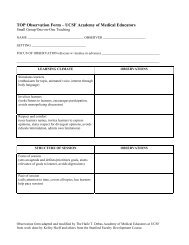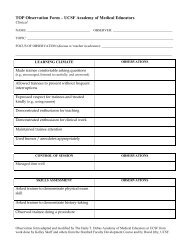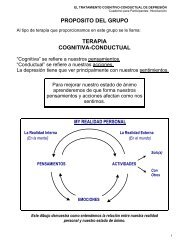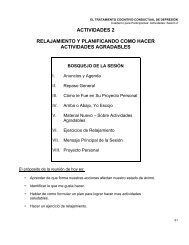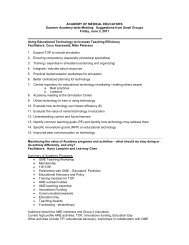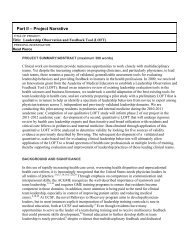The Healthy Management of Reality - Stanford University
The Healthy Management of Reality - Stanford University
The Healthy Management of Reality - Stanford University
Create successful ePaper yourself
Turn your PDF publications into a flip-book with our unique Google optimized e-Paper software.
Consider the following example: In working with depressed individuals, one<strong>of</strong> the problems I have encountered is a severely negative image <strong>of</strong> themselves.Depressed people have a hard time coming up with positive adjectives to describethemselves, but have no problems generating a list <strong>of</strong> negative adjectives. One <strong>of</strong>the tasks <strong>of</strong> therapy is to help the person achieve a sense <strong>of</strong> balance: we work oncoming up with a view <strong>of</strong> the patient that gives her credit for the things she is ordoes which she can justifiably feel proud <strong>of</strong>. At the same time, we question each<strong>of</strong> the negative elements that she ascribes to herself, and attempt to either disprovetheir accuracy, or limit their applicability. Rather than labeling herself as "totallyirresponsible," she might change the label to "procrastinator." And then, we mightpinpoint the fact that she procrastinates only in the area <strong>of</strong> responding to personalletters, while, for example, she routinely pays her bills on time.However, it would be unwise for a person to take the above example anddetermine that, if thinking well <strong>of</strong> oneself is helpful in treating depression, thinkingterrifically well <strong>of</strong> oneself in all areas would be even better. This can lead tounrealistically positive assertions about oneself, which would be hard to maintainfor very long. Also, thinking "too well" <strong>of</strong> oneself is likely to bring forth negativereactions in others. Finally, beliefs that one could accomplish anything one wishesmight lead to unwise investments <strong>of</strong> time and resources in projects that are veryunlikely to succeed. All <strong>of</strong> these reactions are actually seen in many cases <strong>of</strong>manic-depressive illness. During what is called the "manic" phase <strong>of</strong> this disorder,individuals go to the extreme opposite <strong>of</strong> depression, and become abnormallyenergetic, believing that they are extremely intelligent, that their ideas are likely tochange the world, and that they have unusual powers and abilities.HMOR.July2005.Muñoz.doc 31



